Schlagwort: ‘Hospital’
My practical year in Montpellier
- Medicine
- France, Montpellier
- Centre Hospitalier Universitaire (CHU) de Montpellier
- 07/2024 – 10/2024
1. Application/Finding an Internship
From an early stage, it was clear to me that I wanted to complete a substantial part of my practical year, my medical internship, abroad. After planning my first rotation in Dubai and having my second in Germany, I wanted to see and experience something different for my third rotation. I chose to take another challenge: general surgery in Montpellier, Southern France. The application process was relatively straightforward; I sent an email to the head of the department in early 2024, and my application was quickly accepted. Further organization was handled through the universities in France and Germany. The process in France was similar to that in Germany, requiring vaccination records, certain health tests, and proof of insurance. Thanks to EU agreements, I didn’t have to worry about obtaining a visa.
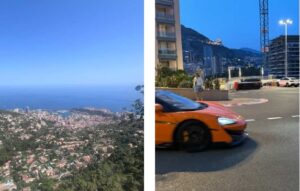
Monaco (left) and the Fairmont Hairpin Curve (right) ©Julia-Laura Schulz
Further planning included my travel arrangements and accommodation. I combined my journey with my family as a little road trip through Switzerland, Italy, and Monaco. For accommodation, I recommend student dormitories, but it is important to note that not all of them accept short-term stays, especially those that span multiple semesters. While I found it easy to secure accommodation for the semester holidays at the start of my internship, I had to move at the beginning of the new semester. Finding new accommodation was quite stressful and not easy, given my work routine and studies. However, in the end, everything worked out.
2. Accommodation & Living Expenses
During my internship, I opted for student housing, which offered a more affordable living option compared to private apartments. The costs for living in Montpellier were manageable, especially considering the financial support I received. I found that groceries were reasonably priced, but dining out could become expensive.
The student dormitories offered essential amenities, such as kitchen facilities, allowing me to cook my own meals, which helped keep my expenses down. While I didn’t strictly budget, I was mindful of my spending since I also wanted to indulge in the local cuisine and travel during my free time. Overall, Montpellier is a vibrant city, and the cost of living was reasonable for a student lifestyle.
3. Everyday Life/The Internship
On the first day of my internship, I registered at the medical faculty next to the hospital, where I enrolled alongside other Erasmus students. I then went directly to the General, Visceral, and Transplant Surgery department, known as “Chirurgie B.” The senior physician responsible for externes showed me around the unit and explained the processes. In France, medical students are referred to as “externes,” while resident doctors are called “internes,” which can be confusing at first, as “interns” in English usually refers to final-year medical students. Our team typically consisted of three German and two French students. The French externes usually rotate every few weeks, which allowed me to meet many different people.
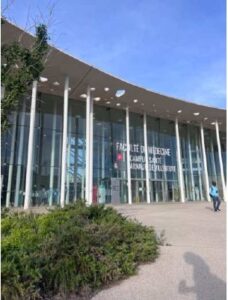
Faculty of Medicine ©Julia-Laura Schulz
Each week, we were assigned to a department, which could include the ward, the operating room, or outpatient clinics. Depending on our interests, we also had the opportunity to rotate through radiology, endoscopy, and anesthesia. Additionally, we had one to two on-call shifts each week (including weekends) for liver transplants. A typical day began with the morning handover from the night shift and a round of visits to all patients on both the general and intensive care wards. After the handover, everyone focused on their own tasks. Once a week, usually on Fridays, there were classes for students, often in the form of OSCE exercises. These sessions were highly educational, although the language barrier sometimes created a tense, exam-like environment. After the classes, the entire team would gather to review and discuss the surgical schedule for the upcoming week, deliberating on various cases. During these discussions, both attending and senior physicians often posed questions to both internes and externes. Additionally, once a month, the internes gave presentations, which were followed by the big weekly rounds.
The general ward was structured similarly to those in Germany, consisting of double and single rooms. The intensive care unit primarily had single rooms, and the operating rooms were comparably designed. Access to various areas of the hospital was secured with access codes. Both internes and externes had a dedicated room on the ward equipped with computers and lockers. All externes received a personal account for the duration of their stay to access computers and the hospital information system.
A particular highlight in Chirurgie B were the liver transplants. During the 24-hour on-call shifts, the ones on-call were responsible for these procedures and had to be prepared to stand in the operating room for about eight hours straight. There was also the opportunity to voluntarily participate in organ retrieval, which often involved traveling to different locations or even flying by private jet. On one occasion, we were escorted by the police, which felt like a movie and was incredibly exciting. The retrieval process is very moving and deeply impressive, as it represents the final and selfless act of brain-dead patients. After retrieval, the liver is transported in a cooled state and appears gray; however, after several hours of surgery and restoration of blood flow, it regains its dark red color. This moment is magical and makes all worries, back pain, and fatigue fade away.
One challenging aspect was the work environment in the department. There was often a tense atmosphere among the resident doctors, which sometimes affected us externes. This led to conflicts between internes and externes, causing misunderstandings with the attending physicians and resulting in stricter oversight. However, thanks to the camaraderie among the externes, this was manageable.
I also wanted to gain insight into neurosurgery, so I contacted the chief physician, who invited me to observe a particularly interesting procedure: an awake brain surgery. The patient underwent head surgery and was awakened for about an hour during the procedure with the assistance of neuropsychologists, who guided her to perform various tasks in order to minimize the risks associated with the surgery. Since I have a strong interest in neurosurgery, this was definitely one of my personal highlights at the clinic.
Despite the initial language barrier and different dialects, I quickly settled in and was able to learn a lot. I observed procedures that I had only previously studied in theory. The awake surgery and the liver transplants were undoubtedly extraordinary experiences that left a lasting impression on me. I would like to extend a special thank you to my colleagues, whose support made the stress of the internship much more bearable. Moreover, the opportunity to forge international connections and broaden my horizons was particularly valuable.
4. Free Time/Tips
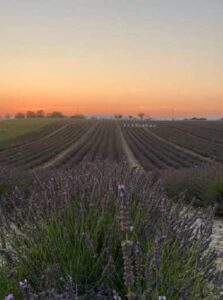
Lavender Fields, Provence ©Julia-Laura Schulz
From the beginning, I met many nice people. After work, we often arranged to meet for dinner, take weekend trips, go canoeing, or even play mini-golf together. A particularly memorable trip was to the lavender fields in Provence, which were breathtakingly beautiful. Watching the Euro football matches together was another unforgettable experience 4 especially the public viewing when France was playing, which created an incredible, lively atmosphere. We also went on trips with the Erasmus group, including horse riding in the Camargue, which was a unique way to explore the region. Numerous wonderful moments were created, and I have many pictures that I enjoy looking at repeatedly.
To pursue my passion for golf, I joined a golf club in Montpellier, where I regularly participated in courses. I met many other golfers, but since this was my last internship rotation, I also had to study for the third state exam, which meant sacrificing some of my free time. During this time, I discovered the university libraries, which I also liked.
The location of Montpellier allowed me to take many trips across Southern Europe. For example, I was able to meet friends in Barcelona or pick up my cousin from her language course in Nice. A particular highlight was our family reunion in Venice for my mother’s birthday, where family members from the USA, the Dominican Republic, and Germany came together. It was wonderful to see the surprised faces of my relatives when they saw us there.
Another delightful moment was when friends from Germany visited me, and we spent a wonderful week together. We explored the city, enjoyed the local cuisine, and shared many unforgettable moments.
On Sundays, I attended mass at various Catholic churches around the city, including the cathedral. Following the mass in French wasn9t always easy, but reading the liturgy beforehand in both German and French helped me follow along more easily and gain more from the sermon.
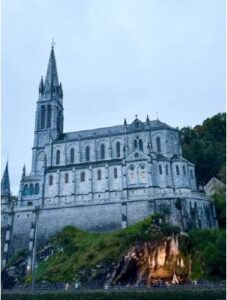
Lourdes ©Julia-Laura Schulz
For my return journey, my family picked me up, and we drove back via Lourdes and Paris. The Rosary procession and the water ritual formed a meaningful and memorable conclusion to my internship.
5. Conclusion
In conclusion, I can confidently say that the last rotation of my internship abroad was a complete success. I learned not only a lot professionally and linguistically but also gained numerous experiences, impressions, and valuable contacts. Montpellier taught me so much, and this experience will stay with me forever. Therefore, I would like to sincerely thank the Erasmus+ internship program for their support, which, along with my family’s assistance, made this stay possible. If you have any further questions, I am happy to help. Thank you!
My practical year in St. Johann in Tirol, Austria
- Medicine
- Austria, St. Johann in Tirol
- Bezirkskrankenhaus St. Johann in Tirol, department of “Allgemein- und Viszeralchirurgie”
- 11/2022 – 01/2023
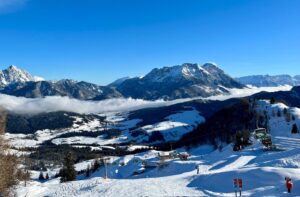
© Angela Kurz
Preparation
I applied around ten months before the start of the Practical Year (called Praktisches Jahr (PJ) in Germany or Klinisch Praktisches Jahr (KPJ) in Austria). However, most places at the hospital “Bezirkskrankenhaus St. Johann in Tirol” are already taken one and a half to two years in advance, so it makes sense to call first and ask if there are still places available. The contact person is the “Sekretariat Ärztliche Direktion”, whose contact details can be found on the hospital’s website. They will also tell you which documents you need for the application. The hospital is a teaching hospital of the Universities of Innsbruck and Vienna. I would recommend contacting Ms. Lemos, the coordinator for study abroad of the medical faculty of the RWTH Aachen University, in time for necessary formalities.
Accommodation
There is a house right next to the hospital where students who are interns at the hospital can stay for free. Each student has their own room and bathroom. The kitchen is shared and is a great meeting place for communal meals and game nights. You also get free breakfast, lunch, and dinner from the hospital. However, the number of rooms is limited, so you should register for this in time. Since there wasn’t a room available at first, I lived in an apartment in the neighbouring town for the first two weeks. Then I was able to move into the student house for the remaining time. I would recommend checking regularly with the secretary’s office, as there are often vacancies in the house at short notice. I found support in finding a private apartment at the secretary of the hospital and the tourism association (Tourismusverband St. Johann in Tirol), each of which sent me a list of contact details of private landlords via e-mail.
Traineeship
On the first day of my internship, I had some organisational tasks to do: I reported to the secretary’s office, received work clothes, a staff ID card, and keys. Then I introduced myself to the surgical department. The working day began daily at 7.15 a.m. with the morning meeting. Afterwards, we medical students took some blood samples on the ward or assisted in the operating theatre. The rest of the time we accompanied the doctors in the surgical outpatient department. The day ended around 4 pm after the X-ray discussion and the ward rounds – on Fridays, usually a little earlier. As a medical student at the hospital in St. Johann, you do two night shifts a month, one during the week from 4 pm until the next morning and one on the weekend. The tasks include taking blood samples, setting up intravenous lines and assisting in the operating theatre if necessary or helping in the emergency room. I would recommend rotating also to orthopaedics/trauma surgery as part of the surgical tertial if possible.
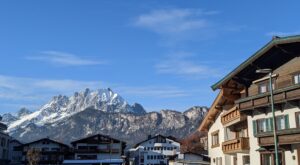
© Angela Kurz
Free time
The region around St. Johann in Tirol is situated in the middle of the mountains and offers many great leisure opportunities. There are many ski resorts nearby, e.g. St. Johann itself, Kitzbühel, Saalbach/Hinterglemm or Ellmau/Scheffau. In some of them you even get a discount with your employee ID card! In other seasons, of course, there are also wonderful hikes to be done. The cities of Kitzbühel, Innsbruck and Salzburg are also not far away. In December, the Kitzbühel Christmas Market is definitely worth a visit!
Conclusion
I really enjoyed my time in St. Johann in Tirol and can recommend a PJ tertial in this great area. I made many new friends, and we made great memories together in the hospital and during our weekends in the mountains.
My experiences in the Netherlands
- Biomedical Engineering M.Sc.
- Netherlands, Utrecht
- UMC Utrecht
- 01.06.2022 – 16.11.2022
Preparation:
To give myself some headroom to deal with the difficult housing market, I started looking for positions about nine months before the planned starting date. By the time I had found a position it was just four months to the starting date so that also had some implications on the available options in the housing market. A lot of general information pages about going abroad in the Netherlands recommend housing agencies like SSH to find student or some form of affordable housing. However, some of these agencies rely on a long waiting list, where it is more likely to get a housing offer the longer you are on the list. So, if you are running low on time, you can probably skip these options and look for alternatives, which saves you money in the process. This is another peculiarity of the Dutch housing market. While the German housing market is fairly accessible through online portals where you can see most of the available housing for free, the Dutch housing market is essentially locked behind a paywall, where most services require a subscription to contact any of the landlords. I found housing through the university hospital, which was by far the cheapest option compared to the private market. I was also required to make an appointment with the municipality for the registration purpose well in advance. I was able to get an appointment about four weeks away from the date I was looking on.
Commuting:
The Dutch system called OV-chipkaart makes commuting easy. It is essentially a prepaid (or bank account linked) public transport ticket which allows you to take every bus or train by simply checking in at the station or in the bus when you get on and checking out when you leave. It may be a little intimidating at first because you are always second guessing yourself if you have checked out correctly, but you can also register your chipkaart in the NS (Nederlandse Spoorwegen) App where you can check your latest chipcard activities. You can either order a personalized (bank account linked) card online, which takes about two weeks, or get a prepaid one at your local supermarket like Albert Heijn or Jumbo. I took the prepaid option which was still very comfortable because recharging stations are readily available at all train or bus stations and even some other locations like supermarkets. However, commuting by bus may become a noticeable financial burden because every trip you take has a flat base fee plus a per kilometre fee. Especially the base fee becomes very noticeable on short distances common inside the city.
With all of that said though, the obvious choice for commuting in the Netherlands is naturally the bike. Especially in Utrecht the bike infrastructure is exceptional. There are well maintained bike paths and bike storage everywhere which makes commuting by bike a treat. I took my bike from Aachen to Utrecht by train which is easy via the NS intercities.
Every-day life/internship:
Life in the Netherlands isn’t really all that different from life in Germany. Supermarket prices are a bit more expensive in some categories but are generally comparable to the ones you would fine here. This also applies to your average take out service, where a decent portion of fries will set you back about 3 € and a high-quality pizza is about 10 €. Payment services are also a non-issue in the Netherlands if you have a German debit card. There are very few places, if any, where you will encounter the need for cash because everything is paid by card, and I haven’t had any issues with my debit card (no extra fees or anything).
The Dutch working culture is also kind of similar but one thing I have encountered during my stay is that they put less emphasize on the lunch break. The lunch breaks were generally quite short (often just shy of 30 minutes) and primarily focused on food consumption. However, this may be attributed to the group I was working in. My internship was in the neuro engineering department of the Medical Centre Utrecht, which was a very international and highly goal oriented, so I spent a lot of time working.
Utrecht as a city also offers great recreational opportunities in forms of parks and proximity to farms around the campus. I regularly took strolls along the fields after work. If you take a bike, there are also a lot of historical landmarks within reach, including a lot of different forts and castles.
Conclusion:
While the housing situation and cost of living may be a little overwhelming in the beginning, the Dutch culture is very approachable and welcoming. The country offers a great experience in terms of travel, be it by bike or by public transport, which was a welcome change from the car centrist life in Germany. The university hospital in Utrecht is very well equipped and offers knowledge in a wide range of topics.
Toledo- an old city with a lot of Spanish flair
- Biology M.Sc.
- Spain, Toledo
- Hospital Nacional de Paraplejicos
- 04.05.2022-30.09.2022
My name is Anna, and I have been studying at the “Hospital Nacional de Paraplejicos” in Toledo from May to October 2022. I study Biology in my Masters. In the following, I will try to share knowledge with you that will help you to make the best out of your stay.
The preparation for my internship focused on transport, insurance, and housing. For my research internship abroad, I travelled to Toledo by plane. I arrived at the airport in Madrid and travelled from there to Toledo by train. If you do not want to go by plane, you can also go by railway. This takes a little bit longer, but you can combine your travel with some stopovers in other beautiful cities. Further you save some CO2 and secure the additional Erasmus funding for a green travel back home.
The health insurance is very simple. If you didn’t already have one included, you can ask your insurance to provide you with a European health insurance card. Keep in mind that most insurances do not cover rescue or repatriation in case something goes wrong on a hiking trip for example. You should ask your insurance about that.
I started to look for a flat or a room in Toledo approx. one month in advance. I made some visiting appointments for the first few days. During this time, I was living in a guest room in the professor’s house. The apartment search turned out to be very difficult. I tried to find a flat with the website “Idealista”. Many accounts didn’t even answer or other flats where small or dubious. Also, the language barrier was a big problem, due to the reason that the most landlords did not speak English. I would recommend all students doing an internship in Spain, to practice some Spanish before your internship abroad. Without the help of my work mates most of the viewing appointments were not able. Further I would recommend structuring your profile on those websites so personal as possible. If you apply for an apartment, you should always bring some personal stuff inside the texts and maybe take up some points of their advertisement.
After visiting some flats without any success, one of my workmates had the idea to look for a room in a student’s residence. I found a place in the “Residence María Immaculada Toledo”. Here I lived in a single room in the casco of Toledo. The rent for one month was 520 euros including breakfast, lunch, and dinner. This room was only available for 1 month, so I had to look for another flat in the meantime. Happily, I found my perfect flat quickly. It was a shared flat with three other Spanish girls in the age between 25-30. All three of them were as well working in the hospital. The flat was just perfect, with a large living room, a large kitchen, and a swimming pool. It was also near to the hospital, so I could walk every day by foot to the work. The rent here was 250 euros excluding extra costs like water and light.
My first impression of Toledo was impressive. It is an old city with a lot of Spanish flair. Exactly what I had expected from Spain. I applied for a position in the “Hospital nacional de paraplejicos”, to do my practical course of my master thesis there. The hospital and the investigation have their focus on spinal cord injuries. The hospital is very new and modern, and my work collogues were helpful and nice from the first moment on. I really enjoyed the work in the hospital. The willing to help was so large from all my work mates, and they integrated me into their team very quickly. I learned a lot of new techniques important for my further working live. I was working on my own project. Although the working language in the laboratory was English, it turned out to be a little bit tricky to communicate. The English knowledge of most of my collogues was rather bad. On the other hand, my Spanish knowledge was not the best. So I decided to learn a lot of Spanish int the next few weeks. The understanding was getting better from day to day. As well in English, but also in Spanish. Quickly I was able to follow conversations in Spanish and to talk some basic sentences.
With the girls of my flat I made friends quickly. They took me on hiking tours, we all signed in for the gym and they told me how to play padel tennis, a very popular sport in Spain. On the weekends we normally went out together and they introduced me to their friends. They took me to cultural events in Toledo and told me which places are worth to visit. Another positive point is the close distance to Madrid. It is only 30 minutes by train, so you can also explore the capital of Spain on the weekends.
Going to Toledo was one of the best decisions of my life. The “Hospital nacional de paraplejicos” is a great hospital with nice work mates and a great investigation department. On top, Toledo is a nice, typical Spanish city with endless opportunities and a close distance to Madrid. I hope that my short report gave you some insights into these opportunities.
My internship in the hospital Bolzano, Italy
- Medicine, Diploma
- Bolzano, Italy
- Hospital Bozen
- 15.11.2021 – 06.03.2022
In Germany the last year of medicine is a practical year, in which you can visit various subjects and hospitals to gain more practical experience. It is divided into three times four months stays each. For my first two month of this practical year, I chose the hospital Bolzano in South Tyrol, Italy. Since I knew this region already from previous holidays, I thought it would be a nice change after the big exam I had in October.
Application
The application process was very easy via email. You can find all information’s you need on the website of the hospital of Bolzano. Just keep in mind to do it one year ahead of the beginning of the internship. For all other organisational matters (contracts, insurance, etc) a staff member, responsible for us students, helped us continuously. She also supported us regarding application and apartment- hunting.
Apartment
Finding a flat was much more difficult than applying for the internship, as the housing market in Bolzano is very scarce and overpriced. Nevertheless, many students live here, and a solution can always be found. I can recommend to look in:
- Facebook groups ( Bolzano Unibacheca Universitari Affitti / Affitto Camera or Immobilienbörse Bozen Umgebung – Wohnungen PRIVAT (ver)mieten & (ver)kaufen)
- or the site: wg-gesucht.de
- and also on the university site: http://accommodationunibz.blogspot.com/.
I found a nice room in the city center in a shared flat with 5 people, which was really nice to connect immediately. Look for a room next to the city centre, since the outside areas are not that nice in general.
Transport
Bolzano is not very big, so you can easily explore the city by walking. However, the hospital was located a little outside town, so I decided to get a second hand bike. Bolzano is a very bike-friendly city. Dedicated bike lanes make it very pleasant to ride and you feel very safe. Some friends of mine preferred to go by bus and bought a Südtirol-Abo Plus card for 150 Euros, which you can also use as train ticket to Trient or cable cars of the mountains. To discover the surroundings of the city, a car is already an advantage, as you are usually much faster than by bus and can thus get to all the places. When we went skiing, we car-pooled and could go straight to the slopes with our skis in the car. It’s simply easier to move around with a car here. Unfortunately, Bolzano has no car sharing, but a bike sharing in the summer months.
Traineeship
My traineeship began in the middle of November 2021. In the Hospital we usually started at 7.30am with the morning reunion. We discussed the patients and the program for the day. After that we all went to have a coffee break together :D. During the day I was free to decide, whether I wanted to go into the surgery room or in the policlinic. The doctors were all extremely nice and polite. The working environment was very friendly and calm. We should at least stay for 6 hours to also get a free lunch, but it was also no problem if you had to leave earlier or could not come at a certain day. Lunch was rich of different options and there were always three courses—yuuummmy! After a while I definitely felt included in the team and could also relieve the doctors of work. It’s definetly an advantage to speak Italian as well as German. In South Tyrol they speak both German and Italian, but Bolzano is a little more Italian, therefore the working language in the hospital is also predominantly Italian. In the outlying areas of Bolzano people prefer to speak German. Most people however are bilingual, so you can easily get around.
Free time

© Chiara Löffler
After work there are a lot of options to spend your free time. The region here is very nice for outdoor activities. The mountains (Dolomites) are incredibly beautiful and in summer you can go hiking, climbing, biking etc and in winter it’s perfect for skiing or Snow hiking.
Since I was there in winter, I mostly went skiing. Obereggen, Seiser Almand Carezza are skiing areas that are approximately half an hour by car away from the city and have very nice slopes. You can also rent a sledge or just go hiking in the snow. You get a reduction on the skipass if you show your clinic employee card.
In March it got warmer and we were able to do some via ferrata and hikes in the surroundings (Eppan, Ritten, Jenesien). On the weekends we also did some city trips to Bologna, Venice, Milan, Verona and Lage Garda, which are all less than 2 hours by car. So, it is perfect to explore the North of Italy.
If you like to stay in town, you can drink coffee or have an Aperitivo (Aperol usually 3,5€) with friends. Expenses are quite cheap for drinking or eating and food here is really good. The weather is also amazing. Here some of my favourite food and drink stops: Bar Osteriada Picchio (book in advance), Al cantuccio (nice pizza), il Corso (nice pizza), Nussbaumer (perfect with parents), Exil Lounge (coffee place). Also I can recommend going to the cinema Film Club Bolzano, they often play movies in original language and the theatre Carambolage, who does most of their performances in German.
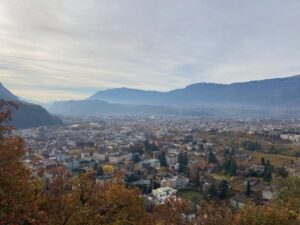
© Chiara Löffler

